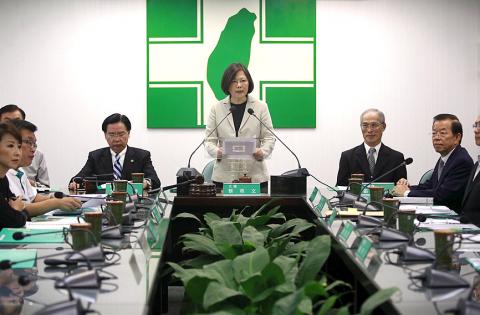Democratic Progressive Party (DPP) presidential candidate Tsai Ing-wen (蔡英文) yesterday lashed out at President Ma Ying-jeou’s (馬英九) planned meeting with Chinese President Xi Jinping (習近平), calling it a manipulation of the January elections and labelling the decisionmaking process as opaque.
“Now is a sensitive period of time as election campaigns are underway in Taiwan, and the public would definitely question whether [the president] is intending to influence the election result by holding a Ma-Xi meeting,” Tsai said.
“If the Chinese Nationalist Party [KMT] always chooses to politically manipulate cross-strait issues ahead of elections, it would have a negative impact on the cross-strait relationship in the long run and would not win support from the people of Taiwan,” she said.

Photo: Reuters
Saying she was shocked upon learning late on Tuesday that Ma is to meet Xi, Tsai panned the decisionmaking process as harmful to Taiwan’s democracy.
“I would like to stress that, we would be happy to see normal cross-strait exchanges based on equality and dignity, openness and transparency, and no political talks,” Tsai said, adding that news of the meeting has triggered questions and doubts from the public because people have lost confidence in the government when it comes to cross-strait exchanges and do not want to see any more opaque decisionmaking.
“I must point out that Ma’s term as president will soon be ending, we therefore would absolutely not allow him to promise something that he cannot be responsible for to gain political reputation for himself,” Tsai said. “He has no right to do so.”
Tsai said that the DPP would keep an eye on the meeting.
In a separate press conference, DPP spokesperson Cheng Yun-peng (鄭運鵬) said that when running for re-election, Ma promised he would not meet with the Chinese leader during his term as president.
“Now that he was in such a rush to arrange a meeting in an opaque way, we demand that he clearly explain to the public why he has to meet with Xi at this time,” Cheng said. “How has he been in touch with the Chinese? How will the meeting proceed, what will he say and what he will do?”
Cheng said that as president, Ma must remember to defend Taiwan’s sovereignty and dignity, and refrain from making moves that would misguide the international community, as well as not make any political promises or sign any documents.

The CIA has a message for Chinese government officials worried about their place in Chinese President Xi Jinping’s (習近平) government: Come work with us. The agency released two Mandarin-language videos on social media on Thursday inviting disgruntled officials to contact the CIA. The recruitment videos posted on YouTube and X racked up more than 5 million views combined in their first day. The outreach comes as CIA Director John Ratcliffe has vowed to boost the agency’s use of intelligence from human sources and its focus on China, which has recently targeted US officials with its own espionage operations. The videos are “aimed at

STEADFAST FRIEND: The bills encourage increased Taiwan-US engagement and address China’s distortion of UN Resolution 2758 to isolate Taiwan internationally The Presidential Office yesterday thanked the US House of Representatives for unanimously passing two Taiwan-related bills highlighting its solid support for Taiwan’s democracy and global participation, and for deepening bilateral relations. One of the bills, the Taiwan Assurance Implementation Act, requires the US Department of State to periodically review its guidelines for engagement with Taiwan, and report to the US Congress on the guidelines and plans to lift self-imposed limitations on US-Taiwan engagement. The other bill is the Taiwan International Solidarity Act, which clarifies that UN Resolution 2758 does not address the issue of the representation of Taiwan or its people in

US Indo-Pacific Commander Admiral Samuel Paparo on Friday expressed concern over the rate at which China is diversifying its military exercises, the Financial Times (FT) reported on Saturday. “The rates of change on the depth and breadth of their exercises is the one non-linear effect that I’ve seen in the last year that wakes me up at night or keeps me up at night,” Paparo was quoted by FT as saying while attending the annual Sedona Forum at the McCain Institute in Arizona. Paparo also expressed concern over the speed with which China was expanding its military. While the US

SHIFT: Taiwan’s better-than-expected first-quarter GDP and signs of weakness in the US have driven global capital back to emerging markets, the central bank head said The central bank yesterday blamed market speculation for the steep rise in the local currency, and urged exporters and financial institutions to stay calm and stop panic sell-offs to avoid hurting their own profitability. The nation’s top monetary policymaker said that it would step in, if necessary, to maintain order and stability in the foreign exchange market. The remarks came as the NT dollar yesterday closed up NT$0.919 to NT$30.145 against the US dollar in Taipei trading, after rising as high as NT$29.59 in intraday trading. The local currency has surged 5.85 percent against the greenback over the past two sessions, central